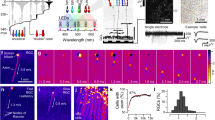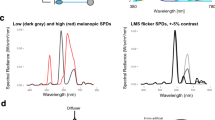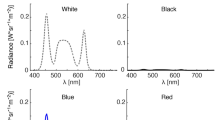Abstract
THE physiological function of the tapetum in the eyes of animals of nocturnal habit is uncertain. However, it may fairly be assumed that by reflecting light incident on the retina back through the layer of end-organs, the tapetum reduces in some measure the absolute threshold for vision1. Since the tapetum is coloured, spectral sensitivities determined from absolute thresholds will also be modified. Murr2, working on the light sense of the domestic cat, attributed differences in the wave-length of maximum visual sensitivity to differences in tapetum colour. In particular, he suggested that there occur changes of this kind during the life of the animal.
This is a preview of subscription content, access via your institution
Access options
Subscribe to this journal
Receive 51 print issues and online access
$199.00 per year
only $3.90 per issue
Buy this article
- Purchase on Springer Link
- Instant access to full article PDF
Prices may be subject to local taxes which are calculated during checkout
Similar content being viewed by others
References
Gunter, R., J. Physiol. (in the press).
Murr, E., Zool. Anz., Supp. III and IV, 254 (1928–29).
Author information
Authors and Affiliations
Rights and permissions
About this article
Cite this article
GUNTER, R., HARDING, H. & STILES, W. Spectral Reflexion Factor of the Cat's Tapetum. Nature 168, 293–294 (1951). https://doi.org/10.1038/168293a0
Issue Date:
DOI: https://doi.org/10.1038/168293a0
This article is cited by
-
Purkinje-Verschiebung der pupillomotorischen Reizschwelle bei der Katze
Albrecht von Graefes Archiv f�r Klinische und Experimentelle Ophthalmologie (1968)
-
Physiologie der höheren Sinne bei Säugern und Vögeln
Journal für Ornithologie (1960)
Comments
By submitting a comment you agree to abide by our Terms and Community Guidelines. If you find something abusive or that does not comply with our terms or guidelines please flag it as inappropriate.



